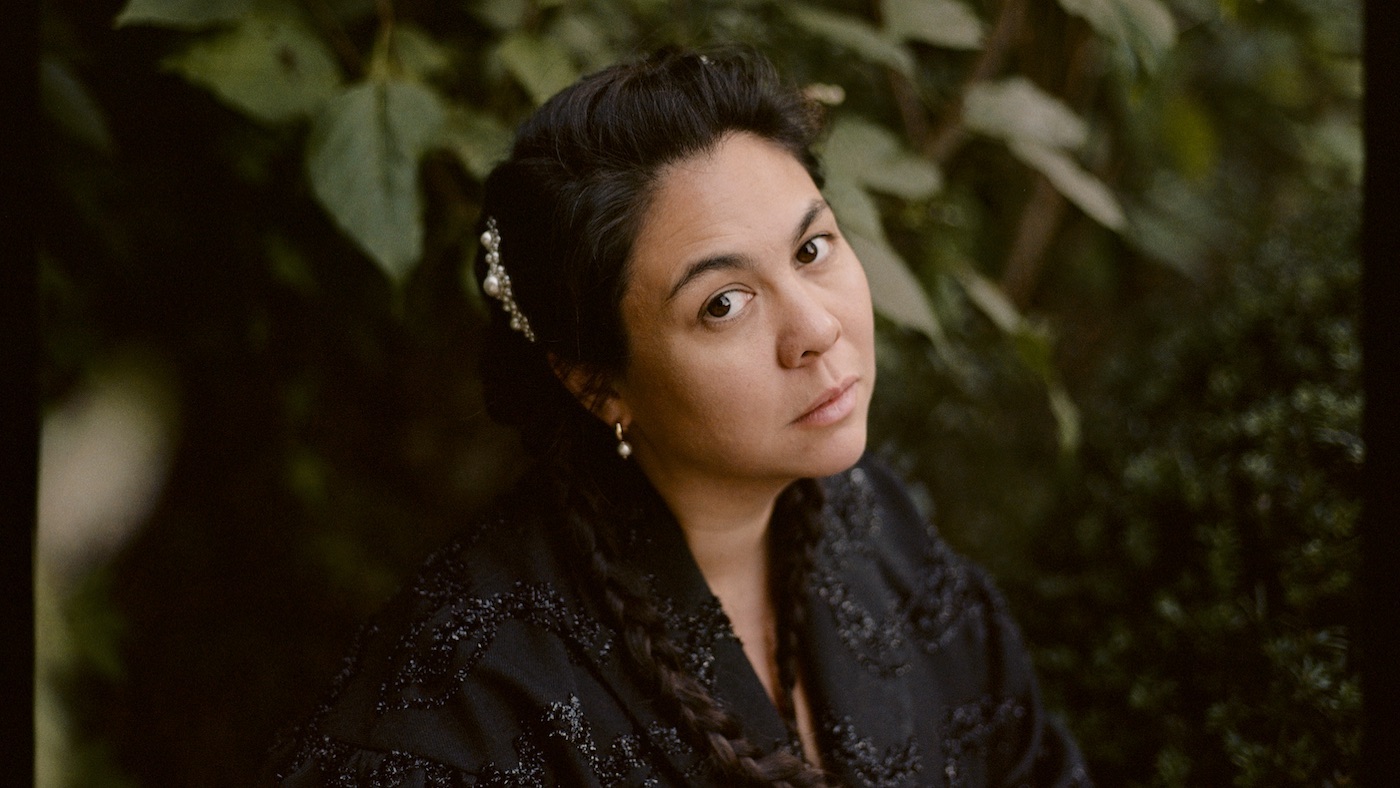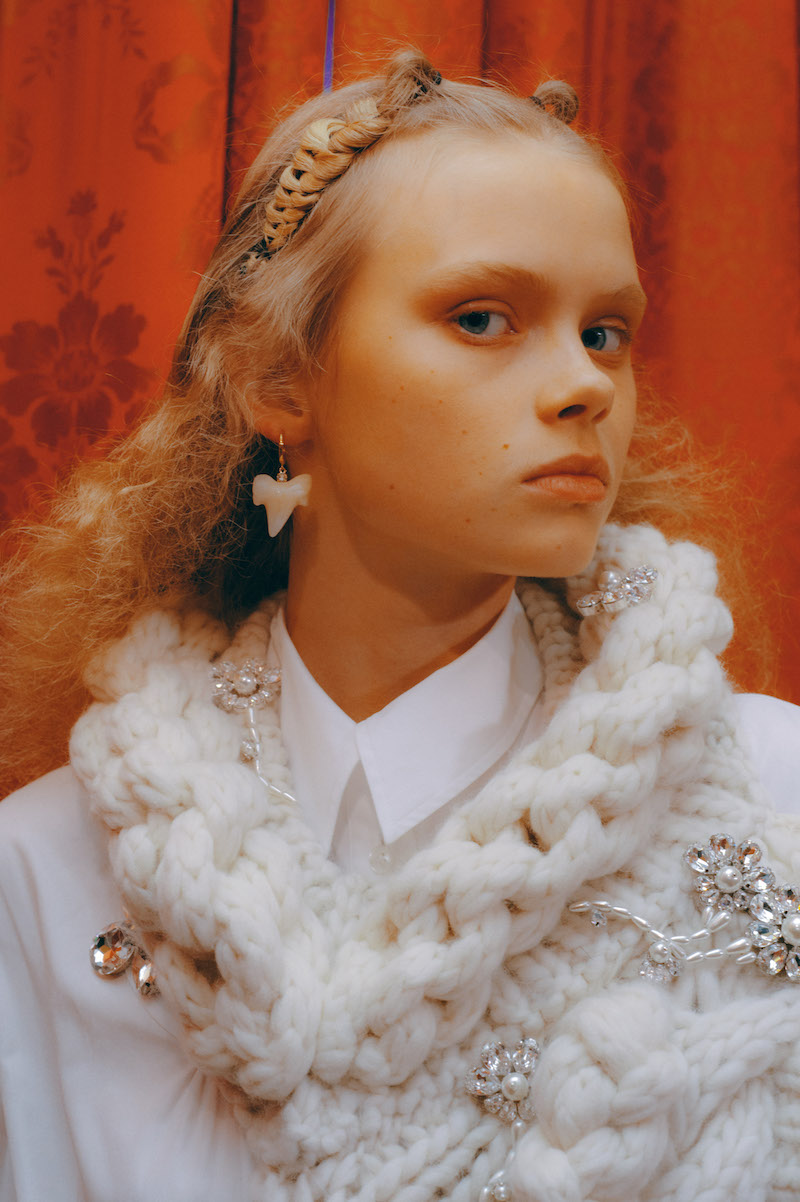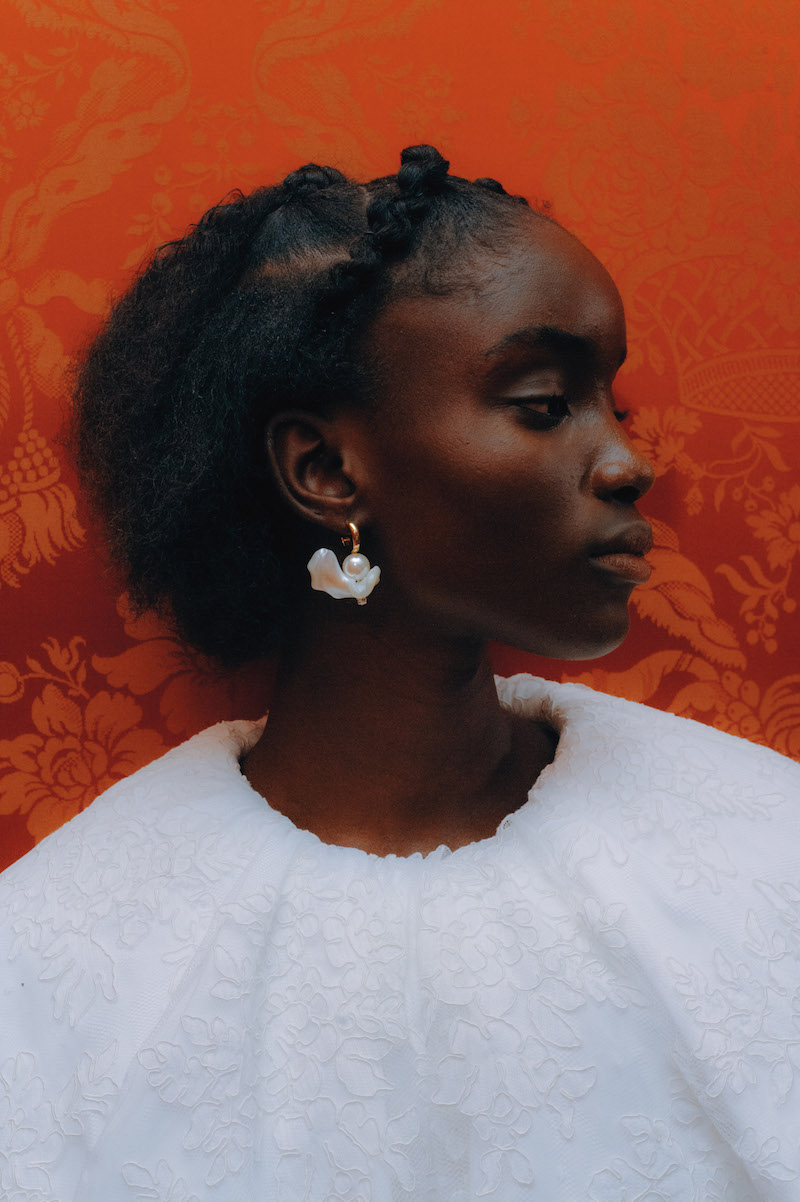The modern romance of Simone Rocha
An emotional thread runs through everything the designer creates

A free daily email with the biggest news stories of the day – and the best features from TheWeek.com
You are now subscribed
Your newsletter sign-up was successful
Those in the know can pinpoint Simone Rocha’s designs frequently and in the most unexpected places. Bereft of any spelled-out branding, Simone-spotters home in on the Irish-Chinese designer’s signature silhouettes, details and fabrications, which include trench coat shapes, artful hand-embroideries (petals, bows, cherubs and Louise Bourgeois’ shapes have all featured) and dirndl-skirted dresses, some cut to feature gathered sleeves and wide collars. Then, there are the London-based label’s accessories: designs nodding to a vintage coin purse, a line of best-selling frame handbags closes at the snap of a metal clasp; elsewhere, Rocha has trimmed flat sandals, slippers and knee high socks with marabou feathers, pearls and pointy metal spikes.
In the lead-up to writing this article, while walking down a supermarket aisle, I recognise both a peony pink taffeta dress with puffed sleeves and a glittering hairslide set with blood red crystals as Rocha’s; in a queue to enter Kew’s Royal Botanic Gardens one late August weekend, I single out a voluminous black coat with dropped shoulders and metal-buckled belt. The next day over lunch, I correctly identify Patcharavipa Bodiratnangkura’s white silk brocade dress with scalloped sleeves as a Simone Rocha. The Thai jewellery designer first discovered Rocha’s designs at experiential retailer Dover Street Market. This autumn, she is eyeing up dresses dotted with embroidered rose motifs and a PVC handbag shaped and textured like a lustrous outsized pearl. Both are items that she says make her feel, “confident, cute and fearless”.
Adrian Joffe, the president of Comme des Garçons International and Dover Street Market, first met Rocha in 2010, the year she graduated from London art school Central Saint Martins. “I felt immediately that there were shared values in the way she approached her work with all her heart and soul,” he says. Today, Rocha’s designs are stocked in Dover Street Market’s London, New York and Ginza outposts. “It has been a delight to watch her grow and evolve, never compromising, and always telling a human story which only deepens her vision and creation.”
The Week
Escape your echo chamber. Get the facts behind the news, plus analysis from multiple perspectives.

Sign up for The Week's Free Newsletters
From our morning news briefing to a weekly Good News Newsletter, get the best of The Week delivered directly to your inbox.
From our morning news briefing to a weekly Good News Newsletter, get the best of The Week delivered directly to your inbox.
Since her September 2010 London Fashion Week debut, Rocha has gathered a loyal – and ever growing – coterie of supporters. Acolytes of the designer’s work include Greta Bellamacina: the British poet and RADA-trained actress discovered Rocha’s work first-hand during a photoshoot. “It reminded me of going to the costume cupboard at drama school. After months of rehearsals, finally getting to wear the character’s costume and being transported into a more theatrical and regal version of myself. Simone’s designs have the same transportative quality,” Bellamacina remembers. She has since purchased a cream silk pearl-dotted Rocha dress. “I bought it when I was heavily pregnant and dreamt of the moment I could put it on. Simone’s dresses are like heirlooms, they hold a certain romantic energy that feels timeless.”
In Manhattan, where Rocha debuted her first stateside boutique in 2017, following the opening of her London Mount Street outlet in August 2015, writer and seasoned Vogue contributor Lynn Yaeger admits to owning, “too many Simones to count”. Embroidered tulle coats and evening dresses are among her most-worn. “I once told Simone that without her designs I would not be very well-dressed, and it is true,” she says. Like others, Yaeger speaks of a sentimental aspect to Rocha’s creations. “There is a black satin coat from last year that was one of the only things that cheered me up during the pandemic lockdown.”

Rocha designs with EQ, balancing artistic, folklorist and historical inspirations: Tang dynasty concubines, 19th century Constable portraiture, contemporary dance choreographer Pina Bausch all feature as inspirations, through a narrative lead by handcrafts and prestige materials, signalling empathy and a desire to connect with the wearer. There’s also a refusal to adhere to set rules of dressing. A hand-embroidered Simone Rocha silk gown is equally at home in a ballroom as it is on the top-deck of a London bus. Indeed, the designer herself has been known to match her grandest designs with Nike trainers.
Via a video call from her studio in east London’s De Beauvoir Town, Rocha says: “It’s something I only discovered through people wearing the clothes. When I started making clothes and being [stocked] in shops, I started to hear from women that when they wear it, they really feel it. It gives them a sense of femininity and strength. For me, that’s the ultimate compliment. To me, that means it’s not disposable, there’s something that they want to hold on to.”
A free daily email with the biggest news stories of the day – and the best features from TheWeek.com
In her work as a designer, Rocha is also notable for the range of people she dresses; her creations have proved to attract across generations, sizes and genders. “I never want it to be narrowed down to a singular vision,” she says. “That’s always been important to me, that it can be a diverse mix of age, size, nationality.”
Rocha’s inclusive design ethos is mirrored in her business set-up. At her London headquarters, Rocha’s team counts roughly 25 members, split across design atelier and sampling rooms. “I have an incredible majority female team around me, all different ages, different nationalities. It’s all different facets of femininity and that’s also something that we think about in our output, when we are designing the collection. It’s really important that we have pieces that are a real reflection of people outside of this building.”
Rocha was raised in Dublin, where her father, the Hong Kong-born fashion designer John Rocha, had based his internationally acclaimed family-run business. John Rocha officially retired following his February 2014 London Fashion Week show; Rocha’s mother Odette subsequently joined her daughter’s burgeoning concern. “I am very involved with my family,” Rocha says today. “I have worked with my mum as a partner for most of my label. We work together on the collections, the stores, the product, the distribution. She is very much the backbone and my father is the guiding light, pointing us in the right direction and keeping us on the straight road.”

Upon graduating from Dublin’s National College of Art and Design – at Ireland’s oldest institution of its kind, Rocha specialised in fashion following a year of multidisciplinary studies – Rocha crossed the Atlantic to intern in the New York City atelier of designer Marc Jacobs, before moving to London, where she enrolled at Central Saint Martins’ esteemed MA Fashion degree. At the art school’s Soho campus, Rocha was taught by the late Professor Louise Wilson. “It was harrowing, but it was incredible,” Rocha says of Wilson’s approach and the course’s demanding curriculum. “I had always been a bad student and I just thought she was the most incredible educator. It was really a privilege to have been one of her students.”
With her Central Saint Martins graduate collection, Rocha first introduced some of her signature flourishes. The designer reimagined masculine silhouettes – a double-breasted jacket, a traditional pea coat – as feminine separates, working with silk tulle and delicate lace. The latter has since become a Rocha speciality, alongside purpose-developed fabrics such as laminated or embellished tweeds, tapestries and crochet. Rocha’s work caught the eye of Lulu Kennedy and the designer made her official London Fashion Week debut as part of Kennedy’s Fashion East talent showcasing scheme.
Tickets to Rocha’s shows have since become much sought after, staged in resplendent London landmarks including Goldsmiths’ Hall – a Grade I-listed centuries- old building in the City of London – Southwark Cathedral and St James’ Lancaster House. The designer produces two seasonal collections per year, eschewing pre-collections altogether. “That always just felt very right for me,” Rocha says. “There’s so much handwork, there’s so much about it that I want to get right. It takes six months to do it right and to do it in a conscious way.”
Her focused approach has endeared Rocha to a host of collaborators. There have been team-ups with global brands, including American denim-maker J Brand and, most recently outerwear specialist Moncler. Elsewhere, Rocha has ambitiously partnered with other creatives, collaborating with photographers – Petra Collins, Colin Dodgson and Jackie Nickerson among them – and blue chip artists such as Roni Horn. Working with Louise Bourgeois’ Easton Foundation, Rocha developed spider web-like prints for her AW19 collection. “I am very lucky that I work with lots of different artists,” says Rocha. In New York’s SoHo, Rocha completed her boutique’s interiors with a set of Bourgeois silkscreens, a Robert Rauschenberg collage and a beeswax sculpture by Chinese biomedia artist Ren Ri. “What stimulates me is not buying art, it’s being able to do these collaborations. Creating work together is what I find exciting.”
When designing, Rocha’s own process has much in common with that of a sculptor. Instead of sketching, she prefers to drape fabric directly, manipulating her material to fall into shapes and forms on the body, which are then photographed and edited. She then drafts in a pattern cutter and members of her design team to put her vision to paper. “We work on translating,” Rocha explains. “I really want to have this bulbous shape on the hip, how can we translate that? Do we work it in with pleating? Or is it all gathered in a seam? Do we need to bring a seam in? I work in a very 3D way that is quite collaborative.”
Following London’s lockdown in late March, Rocha and her team continued their collaboration at a distance, working from their homes. The change brought with it a renewed reliance on handcrafts including embroidery and knitting, traditional skills that, at Rocha’s studio are writ large. “Everyone had to bring their work home, so there was huge focus on us working with our hands. It’s something we do anyway, all our embroideries are always done with yarns and fabrics, and in the hand first,” Rocha explains. “I felt like a conductor, doing it remotely.”
Rocha presented her collection for this autumn during February’s London Fashion Week, a mere few weeks before national lockdown. Her show date coincided with Storm Ciara battering the capital city. “It felt so ominous,” Rocha recalls. “It was a very tempestuous collection anyway.” In her designs, Rocha often draws from rites of passage (baptisms, first communions, weddings, funerals), and the ritualistic get-ups that waymark them. Her AW20 collection also namechecked Riders to the Sea, a 1904 premiered work by Irish playwright John Millington Synge. Set on the Aran island of Irishman, the one-act play details a family’s struggle with the sea and a mother mourning the husband and sons she has lost to the open waters. The drama gave shape to chunky Aran knit sweaters and ivory silk satin with a near liquid sheen, finessed with nautical details such macramé net bags. There were tailored jackets festooned with sashes and the show ended with Simone Rocha brides veiled in Chantilly lace.
Rocha’s AW20 designs come to mind when the designer explains how she dressed growing up in Dublin, mixing her school uniform with vintage finds. “It’s always been that mix of uniformity and things with a historical reference or that have lived a life,” says Rocha of a recipe that has proved irresistible to many.
-
 6 exquisite homes with vast acreage
6 exquisite homes with vast acreageFeature Featuring an off-the-grid contemporary home in New Mexico and lakefront farmhouse in Massachusetts
-
 Film reviews: ‘Wuthering Heights,’ ‘Good Luck, Have Fun, Don’t Die,’ and ‘Sirat’
Film reviews: ‘Wuthering Heights,’ ‘Good Luck, Have Fun, Don’t Die,’ and ‘Sirat’Feature An inconvenient love torments a would-be couple, a gonzo time traveler seeks to save humanity from AI, and a father’s desperate search goes deeply sideways
-
 Political cartoons for February 16
Political cartoons for February 16Cartoons Monday’s political cartoons include President's Day, a valentine from the Epstein files, and more